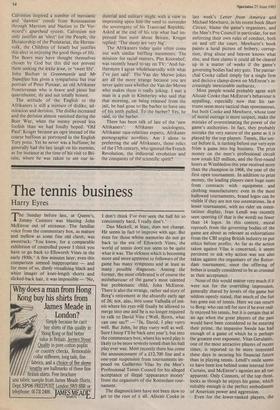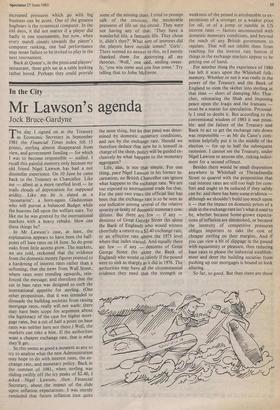The tennis business
Harry Eyres
The Sunday before last, at Queen's, Jimmy Connors was blasting John McEnroe out of existence. The familiar voice from the commentary box, as mature and mellow as some fine old claret, was awestruck: 'You know, for a comparable exhibition of controlled power 1 think you have to go back to Ellsworth Vines in the early 1930s.' A few minutes later, even this comparison seemed inappropriate — and for most of us, dimly visualising black and white images of knee-length shorts and slicked-back hair, it was impossible — `No,
I don't think I've ever seen the ball hit so consistently hard, I really don't.'
Dan Maskell, at least, does not change. He seems in fact to improve with age. But even for those whose memories do not go back to the era of Ellsworth Vines, the world of tennis does not seem to be quite what it was. The sickness which is becoming more and more apparent to followers of the game has many symptoms and at least as many possible diagnoses. Among the former, the most celebrated is of course the misbehaviour of the game's most talented but problematic child, John McEnroe. There is also the strange, rather sad story of Borg's retirement at the absurdly early age of 26; not, alas, into some Valhalla of ten- nis where his eyes will finally be allowed to merge into one and he is no longer required to talk to David Vine ('Well, Bjorn, what can one say?' — `Ja, David, I play vurry well. But John, he play vurry well as well. Sure I hoop I'll be back next year'), but into the commentary box, where his word play is likely to be more severely tested than his ball play ever was. Most recently there has come the announcement of a £12,700 fine and a one-year suspension from tournaments im- posed on Guillermo Vilas by the Men's Professional Tennis Council for his alleged acceptance of illegal 'appearance money' from the organisers of the Rotterdam tour- nament.
The diagnosticians have not been slow to get to the root of it all. Alistair Cooke in
last week's Letter from America and Michael Mewhurst, in his recent book Short Circuit, blame the game's organisers, and the Men's Pro Council in particular, for not enforcing their own rules of conduct, both on and off the court. Mewhurst's book paints a lurid picture of bribery, corrup- tion, drug abuse and heaven knows what else, and then claims it could all be cleared up in a matter of weeks if the game's governing bodies had any guts. The patriar- chal Cooke called simply for a single firm and decisive clamp-down on McEnroe's in- creasingly inexcusable outbursts.
Most people would probably agree with Alistair Cooke that McEnroe's behaviour is appalling, especially now that his tan- trums seem more tactical than spontaneous, but both Cooke and Mewhurst, whose tone of moral outrage is more suspect, make the mistake of overestimating the power of the game's authorities. In fact, they probably mistake the very nature of the game as it is played by the top players. Tennis, like soc- cer before it, is turning before our very eyes from a game into big business. The prize money on the men's professional circuit now totals $25 million, and the first-round losers at Wimbledon this year received more than the champion in 1968, the year of the first open tournament. In addition to prize money, the leading players earn huge sums from contracts with equipment and clothing manufacturers: even in the most hallowed tournaments, brand logos can be visible if they are not too ostentatious. In a lesser tournament, with no rider on osten- tatious display, Ivan Lendl was recently seen sporting (if that is the word) no fewer than 14 logos. In this context, moral reproofs from the governing bodies of the game are about as relevant as exhortations from the CBI urging British industry to put ethics before profits. As far as the action taken against Vilas is concerned, it seems pertinent to ask why action was not also taken against the organisers of the Rotter- dam tournament, since the offering of bribes is usually considered to be as criminal as their acceptance.
None of this would matter very much if it were not for the overriding impression, generally shared by lovers of the game but seldom openly stated, that much of the fun has gone out of tennis. Here we can return to Borg: who can tell for sure if he ever real- ly enjoyed his tennis, but it is certain that at an age when the great players of the past would have been considered to be entering their prime, the impassive Swede has had enough of a game of which he is perhaps the greatest ever exponent. Vitas Gerulaitis, one of the most attractive players of recent times, is reported to be more interested these days in securing his financial future than in playing tennis. Lendl's smile seems to have been lost behind some internal Iron Curtain, and McEnroe's agonies are all too apparent. Only Connors, of the top three, looks as though he enjoys his game, which suitably enough is the perfect embodiment of American power and aggression.
Even for the lower-ranked players, the increased pressures which go with big business can be acute. One of the greatest bugbears is the tyrannical computer. In the old days, it did not matter if a player did badly in one tournament, but now, when every match counts towards the player's computer ranking, one bad performance may mean failure to be invited to play in the next tournament.
Back at Queen's, in the press and players' restaurant, three girls sat at a table looking rather bored. Perhaps they could provide some of the missing clues. I tried to prompt talk of the tensions, the intolerable pressures of life on the circuit. They were not having any of that. 'They have a wonderful life, a fantastic life. They chose it, didn't they?' What sort of interests did the players have outside tennis? 'Girls'. There seemed no answer to this, so I merely thanked them for destroying all my theories. 'Well,' one said, smiling sweet- ly, 'you win some and you lose some.' Try telling that to John McEnroe,



















































 Previous page
Previous page